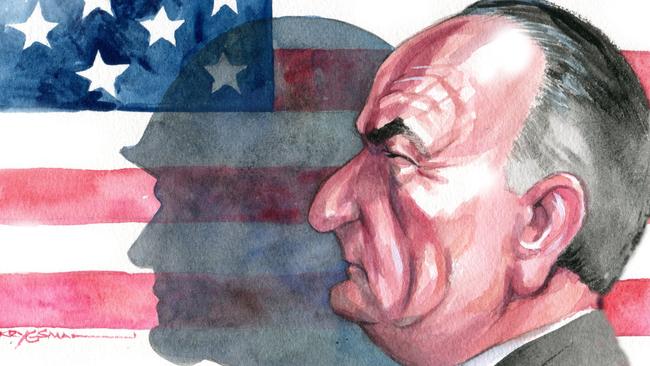
Fifty years ago, US president Lyndon B. Johnson stunned the world when he announced during a nationally televised address that he would not run for re-election in November 1968, and instead would focus his efforts on ending the war in Vietnam.
Johnson’s dream of building “the great society” was undermined by the loss of life, spiralling cost and growing doubt about the war’s progress and purpose. The war he inherited and dramatically escalated had eroded his authority and destroyed the presidency as an office of national unity.
Joseph Califano was Johnson’s most senior adviser on domestic policy, working in the White House from 1965 to 1969. Interviewed for this column, Califano, 86, recalled Johnson’s shock announcement on March 31, 1968.
“He felt he had become a source of division in the country,” Califano said. “He wanted to end the Vietnam war and he thought if he pulled out, Ho Chi Minh would believe him. We also had a serious economic problem and we needed a new tax bill, which we got.
“Four days later, Martin Luther King Jr was assassinated. We had riots in a hundred cities. He was also worried about his health. Lady Bird did not want him to run; she said a weight had been lifted off their shoulders when he announced he was not going to run.”
Although Johnson’s domestic achievements outrank those of any president since Franklin D. Roosevelt, he was haunted by the fear that his ambitious progressive agenda would be sacrificed by a draining of resources to fight a war in Southeast Asia that he privately doubted could be won.
But Johnson’s presidency delivered landmark civil rights legislation, Medicare and Medicaid, Head Start (for the children of disadvantaged families), funding for education, housing, cities and the arts, plus environmental and consumer protection, and programs that reduced poverty by almost half. Contrary to myth, these initiatives were fully funded. When Johnson left office in January 1969, the budget was in surplus.
Califano lamented that Johnson was in many ways “the invisible president” who divided the country on war and race, and was shunned by Democrats and Republicans for a generation. He is now being reassessed. “We are living in Lyndon Johnson’s America,” he said. “The things we took for granted were passed during those frantic five years.”
Johnson seized on the national mood after the assassination of John F. Kennedy to win popular support for the passage of civil rights legislation. But Johnson, who had been Senate majority leader, was also a master of political strategy and the finer arts of legislative tactics. He used a mix of flattery and adulation, intimidation and bullying, and his bulky physical presence to get his way.
This was “the Johnson treatment” deployed daily to persuade recalcitrant legislators. “He would stand over you, he would go nose-to-nose with you, and he used humour, statistics and analogy to get his way,” Califano recalled.
But Johnson recognised that legislating “the great society” was constrained by Vietnam. Democrats lost seats in the House of Representatives and Senate in the November 1966 mid-term elections. The public turned against the war. Congress allowed Johnson to increase taxes only if he cut back spending on domestic initiatives. To protect “the great society” and have any hope of bringing peace to Vietnam, Johnson decided not to seek another term in office. He is the only president since Harry S. Truman not to run for re-election.
Califano looks back on Johnson’s presidency as a time of hope and despair. His memoir, The Triumph & Tragedy of Lyndon Johnson (Simon & Schuster), is one of the best insider accounts of the period. He describes how Johnson could launch into volcanic rages one minute, then be extraordinarily compassionate in the next. “He was a complicated person but he knew what he wanted to do and how to do it,” Califano said.
The tragedy is that Johnson was sceptical about winning in Vietnam, mindful of the French failure a decade earlier, yet expanded the war. In May 1964, he told national security adviser McGeorge Bundy: “I don’t think it’s worth fighting for and I don’t think we can get out.” Johnson agreed with senator Richard Russell, who told him: “It’s the damn worse mess that I ever saw.”
Califano believes the US will never again see a politician like Johnson who wrung so much out of the political system and left a legacy so vast. Today, the executive, legislative and judicial branches of government are broken. They have become corrupted by money, special interests and narrow-mindedness.
His new book, Our Damaged Democracy (Simon & Schuster) makes for sober but compelling reading. It documents a crisis of governance that has been building for decades. The presidency is too powerful, congress is crippled by partisanship and the judiciary has become riven by politics. It is no wonder the quality of candidates running for office has declined.
But with 55.7 per cent voter turnout in the 2016 presidential election, perhaps apathy has delivered the government that Americans deserve. “There is an appalling lack of voting by Americans,” Califano said. “We have to get involved early, in the primaries, and then vote on election day, if we want to change things.
“ We, the people, must act.”
The problems confronting the US, from projected trillion-dollar deficits and senseless gun violence to the growing racial divide and increasing social and economic inequality, reflect a failure by Democrats and Republicans to deal with systemic dysfunction across government. Until that is addressed, the US will continue its long and slow decline.



To join the conversation, please log in. Don't have an account? Register
Join the conversation, you are commenting as Logout